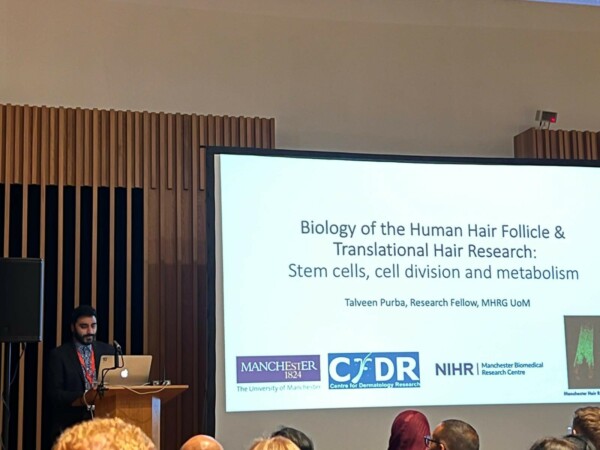Manchester hosts national dermatology event for hair disease experts
Researchers from the National Institute for Health and Care Research (NIHR) Manchester Biomedical Research Centre (BRC) showcased their work to dermatologists from across the country at the UK Symposium on Hair and Scalp Disorders.
More than 120 consultant dermatologists and dermatology trainees came together to learn from national hair disease experts at the event on Friday 3 and Saturday 4 November.
Attendees were also provided with a unique opportunity to examine patient participants with hair loss, allowing discussions to take place to share learning outcomes from complex cases.
The symposium, run by the British Association of Dermatologists and the British Hair and Nail Society, was held in Manchester at the Chetham’s School of Music, with the clinical session taking place at The Dermatology Centre at Salford Royal Hospital, part of Northern Care Alliance NHS Foundation Trust.
This event, which is held every 2 years, was organised by Dr Donna Cummins, Consultant Dermatologist at Salford Royal Hospital.
For his presentation Dr Matthew Harries, Inflammatory Hair Diseases Programme Co-Lead at Manchester BRC and Consultant Dermatologist at Salford Royal Hospital, discussed clinical management of the inflammatory hair loss disorder, alopecia areata (AA).
Dr Harries, who is also a Senior Clinical Lecturer at The University of Manchester, introduced the Global Register for Alopecia areata diseases Severity and treatment Safety (GRASS-UK) – a national disease safety register adopted by the British Association of Dermatologists and hosted in Manchester.

This register will provide real-world data enabling clinicians to assess safety and effectiveness of new AA treatments such as JAK inhibitors, which work by suppressing the immune response associated with AA, as they are introduced.
Dr Harries also presented the AA-Rapid Access Clinic as a way to identify people with newly diagnosed AA and start to understand the early changes in disease development.
The AA-RAC is part of a PhD project which started in October 2023 at The University of Manchester, funded by the first ever Alopecia UK PhD bursary. Dr Harries’ talk raised awareness of the both the GRASS-UK and AA-RAC projects to improve recruitment.

Dr Talveen Purba, Research Fellow and Inflammatory Hair Diseases Programme Co-Lead at Manchester BRC, presented an overview of the biology of the human hair follicle with emphasis on basic research themes relating to stem cells, cell division and metabolism.
He further described related research techniques available to study hair disorders, including hair follicle culture models that can be used to test candidate drugs which could be developed into future treatments. He also presented new findings on metabolic changes and endothelial damage in alopecia areata.
Dr Matthew Harries, Inflammatory Hair Diseases Programme Co-Lead at Manchester BRC, said:
I was delighted to present the work we do in Manchester and Salford, to help people gain a better understanding of alopecia areata and what research can do to improve lives.
“As part of our Inflammatory Hair Diseases programme, the AA-Rapid Access Clinic is a key milestone for Manchester BRC. It will help us improve understanding of the changes that occur early in the disease process, identify new drug targets, and provide an opportunity to reduce longer term risks associated with AA, such as anxiety and depression, and cardiovascular risks. It could potentially lead to research studies exploring whether early treatment can improve long-term prognosis in alopecia areata.”

Dermatologists at the meeting. From left to right: Dr Anwar Alramthan (Hair Loss Clinical Fellow), Dr Matthew Harries (Consultant Dermatologist), Dr Leila Asfour (Consultant Dermatologist), Dr Buket Beresford-Wylie (Dermatology Specialist Registrar), Dr Rui Goncalves (Dermatology Specialist Registrar), Dr Sona Mistry (Dermatology Specialist Registrar), Dr Dan Shaw (Dermatology Specialist Registrar), Dr Donna Cummins (Consultant Dermatologist)